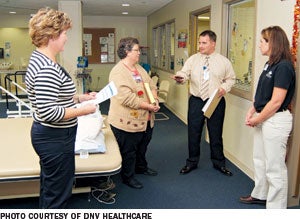DNV attracts attention from health care organizations
 When it comes to hospital accreditation, the Joint Commission, Oak Brook, Ill., has been the go-to organization in the United States for about 40 years, a position made easier to maintain with a near monopoly.
When it comes to hospital accreditation, the Joint Commission, Oak Brook, Ill., has been the go-to organization in the United States for about 40 years, a position made easier to maintain with a near monopoly.
For the past few years, however, new accreditation firm DNV Healthcare, Milford, Ohio, has won over some hospitals with what is characterized as a facility-friendly yet stringent accreditation philosophy that emphasizes ongoing improvement.
In September 2008, the Centers for Medicare & Medicaid Services (CMS) granted deeming authority to DNV, which received a six-year reapproval from CMS in 2012, the maximum period allowed, says Patrick Horine, MHA, CEO of DNV Healthcare.
One important distinction of DNV is that it combines its regular accreditation with ISO 9001 quality management system surveys, a process used for decades by U.S. manufacturers and more recently by some overseas health care systems.
Another key difference between DNV and the Joint Commission is that DNV surveys its member hospitals annually and not every 18 months to three years as
with the Joint Commission, says Horine.
Costs are comparable between the two, he adds.
Horine and a business partner ran what he calls a thriving consulting business that prepared hospitals for the Joint Commission accreditation survey.
"We referred to it as 'getting dressed up for the party' — getting prepared for the survey; and once the survey concluded, it was back to business as usual for many hospitals," Horine says. "We wanted something for hospitals that could be more sustainable in terms of improvements following surveys."
Horine's venture wrote accreditation standards that served as the foundation for the current program, called National Integrated Accreditation for Healthcare Organizations (NIAHO). DNV acquired Horine's business, TÜV Healthcare Specialists, in 2007.
Based in Oslo, Norway, DNV — short for Det Norske Veritas or The Norwegian Truth — is a large, diversified company that started in 1864 and began operating in the United States in 1898.
When CMS granted deeming status to DNV in 2008, it was the first accreditation service approved since the inception of Medicare in 1969 when the Healthcare Facilities Accreditation Program (HFAP), Chicago, received deeming authority approval. HFAP has accredited about 180 hospitals.
But it's not as if DNV is ready to dethrone the Joint Commission, despite 25 to 30 percent annual growth in its five years. DNV has accredited about 300 hospitals with another 80 or so awaiting accreditation, according to Horine. In comparison, the Joint Commission has accredited about 4,200 hospitals and another 380 critical access hospitals.
Horine has a goal of capturing 20 percent of the accreditation market share out of the estimated 5,700 U.S. hospitals within the next five years.
"We are truly trying to partner with the hospital," Horine says. "We have the same goal in mind, and that is to provide the safest, highest-quality care possible to the patients. That's what the hospitals want to do and that's what we want to do."
That philosophy, combined with the ISO 9001 quality management element of the survey, caught the attention of Advocate Health Care, Downers Grove, Ill. Eight of its hospitals have transitioned to DNV in the past year or so.
"They are very thorough in their survey. But they also have a very collegial approach to it. They do the survey in a manner that makes it seem as though they are working with you in a continual improvement mode to get better, and staff feel comfortable with that," says Donna Willeumier, Advocate's administrator of regulatory and clinical projects.
For its part, the Joint Commission welcomes the competition. "While the Joint Commission considers its accreditation process to be the best, we welcome competition because it challenges us to constantly assess ourselves to ensure that we are doing all we can to assist health care organizations in providing the safest and highest-quality patient care," says Elizabeth Eaken Zhani, media relations manager, the Joint Commission.
| Sidebar - Fast Facts |
| Joint Commission History: Founded in 1951, it is the nation's oldest health care accrediting agency. Number accredited: 4,168 hospitals from general to children's to psychiatric and more, and 378 critical access hospitals. Structure: A nonprofit organization that provides solely health care accreditation and related services. Survey process: A hospital must undergo every 18 months to three years an on-site, usually unannounced survey. The Intracycle Monitoring process includes a Focused Standards Assessment, submitted approximately every 12 months following a survey. ISO 9001 certification is being pilot-tested. Cost: Average is $33,000 for three years, but varies by facility size and complexity. Website address: www.jointcommission.org DNVHistory: National Integrated Accreditation for Healthcare Organizations (NIAHO) standards approved for CMS deeming authority in 2008 and received six-year approval in 2012. Offers ISO 9001 quality management process certification. Number accredited: About 300 hospitals, with an estimated 80 awaiting accreditation. Structure: Large diversified company based in Oslo, Norway, with DNV Healthcare Inc. headquarters in Milford, Ohio. Survey process: NIAHO and ISO 9001 surveys are done together through Tracer Methodology as well as staff and patient interviews. Follow-up surveys are done annually. Cost: Based on size and complexity of facility and comparable to Joint Commission, DNV says. Website address: www.dnvaccreditation.com |




